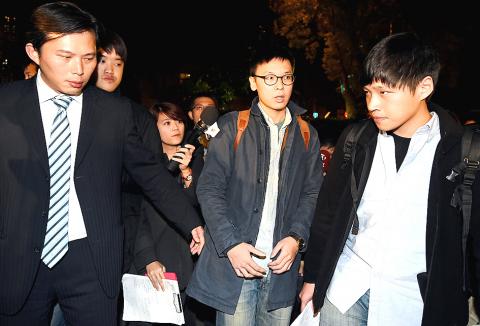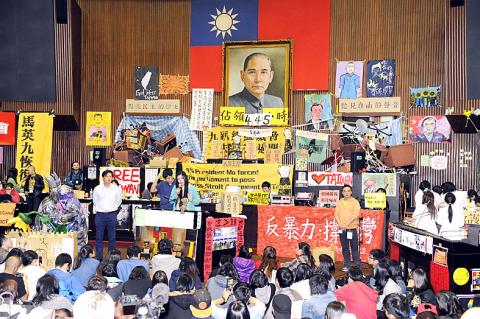Prosecutors yesterday filed charges against 119 people — including leading figures Lin Fei-fan (林飛帆), Chen Wei-ting (陳為廷), Dennis Wei (魏揚) and Huang Kuo-chang (黃國昌) — for their roles in the student-led Sunflower movement that occupied the main legislative chamber last year and subsequent rallies opposing what the protesters called the Chinese Nationalist Party (KMT) government’s opaque handling of a trade-in-services pact with China.
Lin, Chen and Huang were among 22 indicted for breaking into the Legislative Yuan on March 18 last year, which led to an occupation lasting almost 23 days by hundreds of protesters. Wei, who led another group of protesters in an offshoot siege of the Executive Yuan across the road on March 23 last year, was one of 93 people indicted over that incident. Charges were also brought against Hung Chung-yen (洪崇晏) and two others, who on April 11 last year took to the Web to mobilize a large crowd to surround the Zhongzheng First Police Precinct near the legislature, the precinct responsible for maintaining order during the protests.
At least two foreigners were also among the 119 indicted — US political activist and long-term resident Lynn Miles, who is also known by his Chinese name Mei Hsin-yi (梅心怡), and Canadian photojournalist David Smith.

Photo: Chu Pei-hsiung, Taipei Times
According to the indictment, the charges against the 119 included instigating others to commit a crime, trespassing, illegal entry into a building, obstructing an officer from discharge of duties, insulting a public official or office and violating the Assembly and Parade Act (集會遊行法).
In response to the indictment, Huang wrote a Facebook post yesterday, rejecting the grounds on which many students were indicted.
“I did not incite any criminal activities, and I ask the public to bravely resist the Ma administration’s abuse of authority and stand up to save Taiwan’s democracy, which is on the verge of falling off a cliff,” he said.

Photo: Chen Chih-chu, Taipei Times
Chen said the government had perverted the judicial system, adding: “There are 119 people being charged, but what about the police officers who used violence against civilians and [then-premier] Jiang Yi-huah (江宜樺), who ordered the crackdown against protesters? None of them have been charged. The judiciary is biased. It only persecutes civilians and does not go after government officials.”
“We were fighting against the signing of the service trade agreement with China. It was a civil resistance action against the government; the people who participated are not guilty of any crime,” Wei said.
Wei’s mother, Yang Tsui (楊翠), a prominent Taiwanese literature academic, said she suspected the prosecutors’ move was made under duress.
Yang backed Wei and his fellow activists, saying: “Civil disobedience is necessary and legitimate, and what the students admitted doing were not wrongdoings, but necessary actions.”
The indictments come as no surprise to those familiar with the KMT’s political maneuvers, she said, adding that the indicted students would not evade their legal responsibility and that she was thankful for lawyers who volunteered to help.
“There would have been no protests if politics was clean. The students stood up to the government precisely because it is not,” she said.
Student activist Lai Pin-yu (賴品妤), a member of the Black Island National Youth Front, said that participants in the occupation of the legislature’s main chamber knew from the start that they would be required to take legal responsibility for their actions.
However, she also asked if police officers who cleared the protesters should face charges for their actions, and accused President Ma Ying-jeou’s (馬英九) administration of being lenient on police brutality.
Meanwhile, Democratic Progressive Party (DPP) spokesperson Cheng Yun-peng (鄭運鵬) acknowledged the protesters’ actions, which he said were carried out in the name of the nation’s democracy and should not be considered criminal.
The DPP called for the judiciary to regard the incident from a historical perspective and refrain from damaging democracy.
Executive Yuan spokesperson Sun Lih-chyun (孫立群) said the Executive Yuan hoped that those charged would be treated with “a tolerant attitude,” but said the charges should not be dropped.
Additional reporting by Hua Meng-ching, Chen Hui-ping, Lii Wen, Alison Hsiao and CNA

NATIONAL SECURITY THREAT: An official said that Guan Guan’s comments had gone beyond the threshold of free speech, as she advocated for the destruction of the ROC China-born media influencer Guan Guan’s (關關) residency permit has been revoked for repeatedly posting pro-China content that threatens national security, the National Immigration Agency said yesterday. Guan Guan has said many controversial things in her videos posted to Douyin (抖音), including “the red flag will soon be painted all over Taiwan” and “Taiwan is an inseparable part of China,” while expressing hope for expedited “reunification.” The agency received multiple reports alleging that Guan Guan had advocated for armed reunification last year. After investigating, the agency last month issued a notice requiring her to appear and account for her actions. Guan Guan appeared as required,

Japan and the Philippines yesterday signed a defense pact that would allow the tax-free provision of ammunition, fuel, food and other necessities when their forces stage joint training to boost deterrence against China’s growing aggression in the region and to bolster their preparation for natural disasters. Japan has faced increasing political, trade and security tensions with China, which was angered by Japanese Prime Minister Sanae Takaichi’s remark that a Chinese attack on Taiwan would be a survival-threatening situation for Japan, triggering a military response. Japan and the Philippines have also had separate territorial conflicts with Beijing in the East and South China

A strong cold air mass is expected to arrive tonight, bringing a change in weather and a drop in temperature, the Central Weather Administration (CWA) said. The coldest time would be early on Thursday morning, with temperatures in some areas dipping as low as 8°C, it said. Daytime highs yesterday were 22°C to 24°C in northern and eastern Taiwan, and about 25°C to 28°C in the central and southern regions, it said. However, nighttime lows would dip to about 15°C to 16°C in central and northern Taiwan as well as the northeast, and 17°C to 19°C elsewhere, it said. Tropical Storm Nokaen, currently

PAPERS, PLEASE: The gang exploited the high value of the passports, selling them at inflated prices to Chinese buyers, who would treat them as ‘invisibility cloaks’ The Yilan District Court has handed four members of a syndicate prison terms ranging from one year and two months to two years and two months for their involvement in a scheme to purchase Taiwanese passports and resell them abroad at a massive markup. A Chinese human smuggling syndicate purchased Taiwanese passports through local criminal networks, exploiting the passports’ visa-free travel privileges to turn a profit of more than 20 times the original price, the court said. Such criminal organizations enable people to impersonate Taiwanese when entering and exiting Taiwan and other countries, undermining social order and the credibility of the nation’s